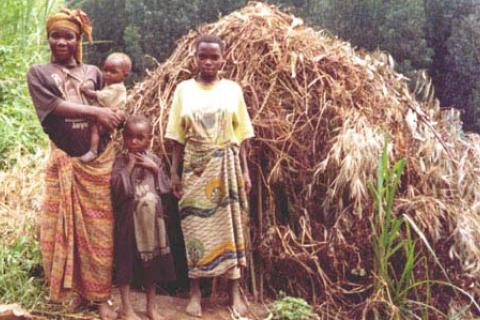According to the most recent official estimates (Forest Survey of India, 2003 State of Forests Report), India continues to lose its forest cover. The 2003 estimates record a net minus change of nearly three million hectares of ‘dense forests’, which means serious and continued deforestation in forests with canopy density of 40 percent and above.
Other information
Many European NGOs believe that government procurement has a great potential to contribute to responsible forest management globally. According to WWF figures, governmental purchase of timber and timber products is estimated to account for 18 percent of total timber imports into G8 countries. Worth $20 billion annually, this constitutes a formidable economic force in the international timber market.
Thousands of indigenous peoples are displaced from their land, which is militarized and expropriated in an unending genocide. Oil exploitation is carried out – causing damages that go uncompensated – without consulting the communities and with the connivance of the government of the time. Transnational companies such as Shell, Repsol, and Maxus appropriate territorial spaces under the pretext that they are of “public utility”, they contaminate bodies of water and river beds, they deforest virgin forests and generate impacts destroying the future.
In 1999, the World Bank's Economics of Industrial Pollution Control research team published a report titled "Greening Industry". The report, which was the result of "six years of research, policy experiments, and firsthand observation", described Asia Pulp and Paper's PT Indah Kiat Pulp and Paper as a "success story".
The herbicide glyphosate was identified in 1974 by John Franz, a scientist working for US-based agro-industrial multinational Monsanto. Today Monsanto boasts that its glyphosate products, which include the herbicide Roundup, are "among the world's most widely used herbicides".
Glyphosate works by interfering with the metabolism of the plant and a few days after spraying, plants wilt, turn yellow and die. Glyphosate herbicides also contain chemicals which make the herbicide to stick to leaves so that the glyphosate can move from the surface of the plant into the plant's cells.
On 23 June 2005, the Association for the Defence of the Galician river mouth (Asociación pola defensa da Ria de Galicia) sent a letter to the FSC delegation in Spain, requesting “the urgent cancellation of sustainable forest management certification granted to NORFOR, given the serious deficiencies in the certification report and the clear inadequacy of NORFOR’s management system with respect to FSC principles and criteria.”
The NORFOR company is a subsidiary branch of the Spanish pulp and paper company Ence, certified in April 2005.
Let us make no mistake. When the IMF talks about a “favourable environment,” it is referring to business, to a favourable environment for direct foreign investment through operations on the stock exchange, or indirect foreign investment through the operation of transnational companies.
New policies, old problems. Ever since the 1970s, the World Bank has struggled to define an approach to forests, which reconciles its expressed commitment to poverty alleviation with its model of promoting ‘development’ through top-down growth and commercialisation. Free market models of development based on private property rights do not fit well with conventional forestry approaches. Since the 1700s, the dominant model of ‘scientific forestry’, developed in Europe, has opposed the free play of market forces by reserving forests for State-chosen strategic interests.
Since it was founded in 1956, the International Finance Corporation (IFC) has committed more than US$44 billion of its own funds and arranged a further US$23 billion in loans for 3,143 companies in 140 countries. According to its mission statement, IFC exists to "promote sustainable private sector investment in developing countries, helping to reduce poverty and improve people's lives."
Globalisation, a corporate-led process across the world, has had immense negative social and environmental impacts, particularly in the Third World. Though the huge commercial forces behind globalization have tried to make people think that it is some kind of an uncontrollable force of nature, and that the famous free market rules the world by its own right, there is increasing awareness that a large part of such devastation is financed and backed by tax-payers' money using national export credit agencies, commonly known as ECAs.
“The worst immorality is a studied ignorance, a purposeful refusal to see or know” (Andrea Dworkin)


